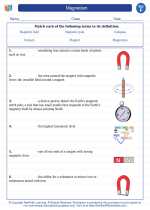Commensalism
Definition
Commensalism is a type of symbiotic relationship between two species in which one species benefits without affecting the other species positively or negatively. The species that benefits is called the "commensal," while the other species is called the "host."
Example
An example of commensalism is the relationship between barnacles and whales. Barnacles attach themselves to the skin of whales and benefit from being carried to areas with abundant food, while the whales are not significantly affected by the presence of the barnacles.
Characteristics
- The commensal benefits from the relationship, while the host is neither significantly harmed nor helped.
- Commensalism can occur between species of different kingdoms, such as animals and plants, or within the same kingdom.
- The relationship is often one-sided, with only one species benefiting, while the other remains unaffected.
Study Guide
To effectively study commensalism, consider the following points:
- Understand the definition of commensalism and be able to differentiate it from other types of symbiotic relationships, such as mutualism and parasitism.
- Learn and be able to provide examples of commensalism in different ecosystems, such as marine, terrestrial, and aquatic environments.
- Explore the ecological significance of commensalism and its impact on the stability and dynamics of ecosystems.
- Identify the characteristics of commensalism and how they distinguish it from other ecological interactions.
- Consider the diversity of commensal relationships and how they may vary across different species and environments.
◂Science Worksheets and Study Guides Sixth Grade. Magnetism
Study Guide Magnetism
Magnetism  Activity Lesson
Activity Lesson Magnetism
Magnetism  Worksheet/Answer key
Worksheet/Answer key Magnetism
Magnetism  Worksheet/Answer key
Worksheet/Answer key Magnetism
Magnetism  Worksheet/Answer key
Worksheet/Answer key Magnetism
Magnetism  Worksheet/Answer key
Worksheet/Answer key Magnetism
Magnetism  Vocabulary/Answer key
Vocabulary/Answer key Magnetism
Magnetism 

 Activity Lesson
Activity Lesson
 Worksheet/Answer key
Worksheet/Answer key
 Worksheet/Answer key
Worksheet/Answer key
 Worksheet/Answer key
Worksheet/Answer key
 Worksheet/Answer key
Worksheet/Answer key
 Vocabulary/Answer key
Vocabulary/Answer key

The resources above cover the following skills:
EARTH AND SPACE SCIENCE
Earth’s Systems
Develop and use models of Earth’s interior composition to illustrate the resulting magnetic field (e.g., magnetic poles) and to explain its measureable effects (e.g., protection from cosmic radiation).